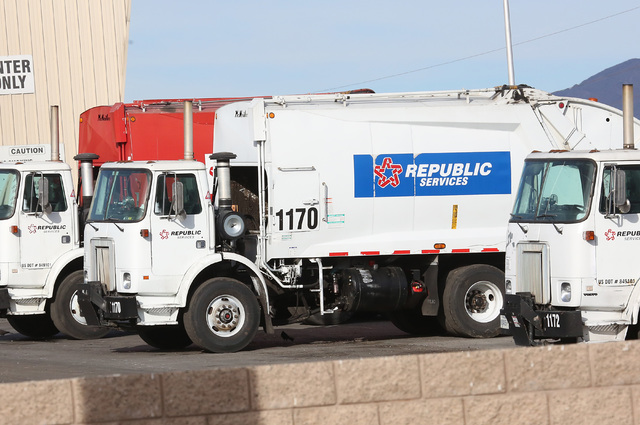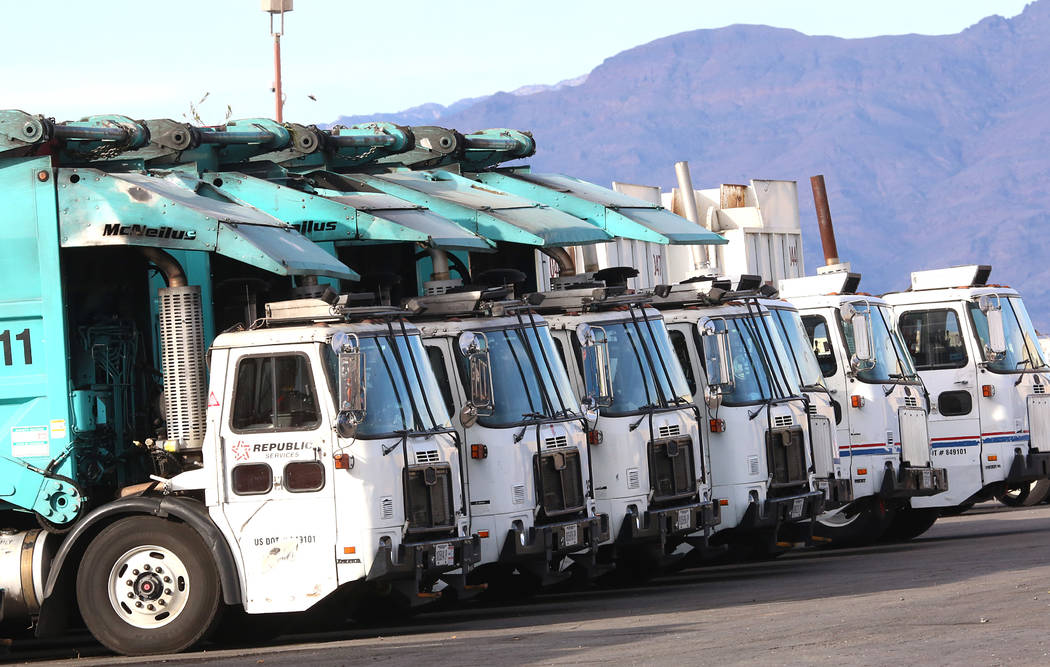Las Vegas City Council may vote on waste contract as Legislature works proposal to open competition


The Las Vegas City Council next week will consider a new long-term exclusive contract with waste-hauler Republic Services, while state legislators mull a bill that would limit such deals.
The city’s current franchise agreement with Republic expires in 2021, and if approved, the new contract would be retroactive to July 1 and run through June 30, 2033. It calls for implementing a single-stream recycling program in Las Vegas, which means materials do not need to be sorted before they are hauled away.
Meanwhile in Carson City on Thursday, the Senate Committee on Natural Resources heard Senate Bill 315, which state Sens. Patricia Farley and Mo Denis introduced this month as a way to encourage competition in the waste and recycling industries in Nevada.
“This bill does not pick winners and losers,” Farley said at the hearing. “It is not government’s job to do that.”
Farley and Denis this week sent a letter to Mayor Carolyn Goodman asking the council to delay taking action on a franchise agreement until “we all can answer important policy questions in the Legislature.”
Goodman this week called the 12-year extension beyond 2021 “a little much” and said that although she would like to see it reduced, she wanted to see the council move forward and take action.
The Senate committee on Thursday heard from a number of people in Carson City and Las Vegas on both sides of the issue, including seven Republic employees in Las Vegas who said they were concerned they would lose their jobs if the proposal becomes a law.
The city of Las Vegas’ government affairs manager Brian McAnallen testified against the bill, calling it “too limiting.”
The city has been negotiating the franchise agreement with Republic for more than a year, while opponents have made repeated calls for the city to put the contract out to bid. Local advocacy group Citizen Outreach launched a petition this month urging a competitive bidding process.
Henderson, North Las Vegas and most of Clark County have single-stream recycling through long-term contracts with Republic.
The proposed agreement lets the city exclude up to 30 percent of its annual sewage waste. That portion could then be competitively bid. The excluded amount rises to 40 percent on July 1, 2021, and 50 percent after July 1, 2026.
Contact Jamie Munks at jmunks@reviewjournal.com or 702-383-0340. Find @JamieMunksRJ on Twitter.
RELATED
Las Vegas City Council asked to hold off on looming Republic Services vote
Republic Services, Simple ESG to try resolving differences at meeting
Business owners file complaints over Republic Services with Southern Nevada municipalities
DEAL ON THE TABLE
Details of the proposed exclusive franchise agreement between Las Vegas and Republic Services:
- Republic Services will continue paying the city a franchise fee that’s 5 percent of gross receipts.
- Sets recycling effectiveness goals: 25 percent recycling goal by June 30, 2019. The goal is calculated as: the total annual recycling tons collected divided by the total annual trash and recycling tons collected. The goal would increase by 1 percent annually for the next five years, reaching 30 percent in 2024.
- By Dec. 31, 2018, the franchisee will implement single stream recycling collection and operate a household hazardous waste drop-off program for residential customers.
- The company will offer residential customers an optional second trash collection per week for a $13.15 monthly rate.
- The city can implement additional franchise and environmental fees that the company can pass through to its customers.
- The city will receive an annual $500,000 service credit the first year, with annual increases of $200,000 after that. On July 21, 2021, that annual credit will be capped at $1.3 million and adjusted each year based on the consumer price index. The city will receive a $300,000 annual allowance for code enforcement and a $40,000 annual administrative fee.
- Customer rates will be adjusted annually based on the greater of the previous year’s consumer price index or the five-year average change in the consumer price index.












